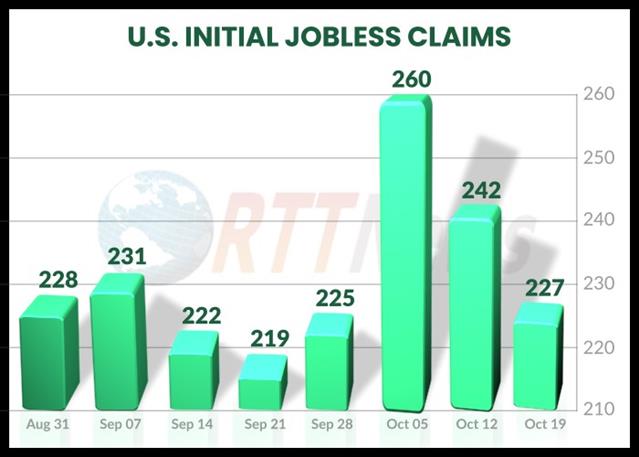Asian Markets Trade Mixed
Following the broadly negative cues from Wall Street overnight, Asian stock markets are trading mixed on Thursday, as traders continue to be cautious ahead of the release of key U.S. inflation data la...

Following the broadly negative cues from Wall Street overnight, Asian stock markets are trading mixed on Thursday, as traders continue to be cautious ahead of the release of key U.S. inflation data later in the day. Some traders also looked to cash in on the recent strength in the markets. Asian Markets closed mixed on Wednesday.
The inflation data is likely to have a notable impact on the outlook for interest rates, as US Fed officials have said they need greater confidence that inflation is slowing before cutting rates.
The Australian market is slightly higher on Thursday after opening in the red, recouping the losses in the previous session, following the broadly negative cues from Wall Street overnight. The benchmark S&P/ASX 200 is staying below the 7,700 level, with gains in some gold miners and energy stocks.
The benchmark S&P/ASX 200 Index is gaining 9.20 points or 0.12 percent to 7,669.60, after hitting a low of 7,631.00 earlier. The broader All Ordinaries Index is up 11.00 points or 0.14 percent to 7,928.10. Australian stocks ended slightly lower on Wednesday.
Among major miners, BHP Group is losing almost 1 percent and Rio Tinto is edging down 0.3 percent, while Fortescue Metals and Mineral Resources are declining almost 2 percent each.
Oil stocks are mixed. Woodside Energy and Santos are edging down 0.1 to 0.3 percent each, while Origin Energy and Beach energy are edging up 0.1 to 0.3 percent each.
In the tech space, Appen and Xero are declining almost 2 percent each, while Zip is slipping more than 2 percent and WiseTech Global is losing almost 1 percent. Afterpay owner Block is edging up 0.3 percent.
Among the big four banks, Commonwealth Bank, ANZ Banking and National Australia Bank are edging down 0.2 to 0.5 percent each, while Westpac is declining almost 1 percent.
Among gold miners, Evolution Mining is edging down 0.4 percent, while Northern Star Resources is edging up 0.4 percent and Newmont is gaining almost 1 percent. Resolute Mining and Gold Road Resources are flat.
In economic news, the total value of retail sales in Australia was up a seasonally adjusted 1.1 percent on month in January, the Australian Bureau of Statistics or ABS, said on Thursday – coming in at A$35.723 billion. That missed forecasts for an increase of 1.6 percent following the 2.7 percent contraction in December.
The ABS also said total value of new capital expenditure in Australia was up a seasonally adjusted 0.8 percent on quarter in the fourth quarter of 2023 – coming in at A$40.061 billion. That beat forecasts for an increase of 0.4 percent following the downwardly revised 0.3 percent increase in the previous three months (originally 0.6 percent). On a yearly basis, overall capex was up 7.9 percent.
Further, the Reserve Bank of Australia said total credit in Australia’s private sector was up a seasonally adjusted 0.4 percent on month in January – unchanged and in line with expectations. On a yearly basis, overall credit climbed 4.9 percent as housing credit was up 4.2 percent, personal credit added 1.2 percent and business credit jumped 6.8 percent.
In the currency market, the Aussie dollar is trading at $0.651 on Thursday.
Adding to the slight losses in the previous session, the Japanese market is notably lower on Thursday, following the broadly negative cues from Wall Street overnight. The Nikkei 225 is falling below the 38,000 mark, with weakness across most sectors led by index heavyweights and exporter stocks.
The benchmark Nikkei 225 Index closed the morning session at 38,953.49, down 254.54 points or 0.65 percent, after hitting a low of 38,876.81 earlier. Japanese shares ended slightly lower on Wednesday.
Market heavyweight SoftBank Group is losing more than 1 percent and Uniqlo operator Fast Retailing is edging down 0.4 percent. Among automakers, Toyota is edging down 0.3 percent and Honda is gaining almost 1 percent.
In the tech space, Advantest and Tokyo Electron are edging down 0.3 to 0.4 percent each, while Screen Holdings is losing more than 1 percent.
In the banking sector, Sumitomo Mitsui Financial, Mizuho Financial and Mitsubishi UFJ Financial are edging down 0.1 to 0.4 percent each.
Among the major exporters, Canon is edging up 0.5 percent, while Panasonic is losing more than 1 percent, Mitsubishi Electric is declining almost 1 percent and Sony are down almost 2 percent.
Among other major losers, Tokyo Gas and Tokyo Electric Power are declining more than 3 percent each, while Ajinomoto is losing almost 3 percent.
Conversely, Nomura Holdings, Aozora Bank is soaring almost 12 percent and Seven & I Holdings is surging almost 6 percent, while Kawasaki Kisen Kaisha and Alps Alpine are gaining more than 3 percent each. Hoya is adding almost 3 percent.
In economic news, industrial production in Japan was down a seasonally adjusted 7.5 percent on month in January, the Ministry of Economy, Trade and Industry or METI, said on Thursday. That missed forecasts for a decline of 6.7 percent following the 1.4 percent increase in December. On a yearly basis, industrial production sank 1.5 percent after shedding 0.7 percent in the previous month. Upon the release of the data, the METI downgraded its assessment of industrial production, saying that it continues to fluctuate indecisively but that it has weakened. According to the METI’s forecast of industrial production, output is expected to rise 4.8 percent on month in February and 2.0 percent in March.
The METI also said the total value of retail sales in Japan was up 2.3 percent on year in January – coming in at 13.141 trillion yen. That beat forecasts for an increase of 2.0 percent following the upwardly revised 2.4 percent gain in December. On a seasonally adjusted monthly basis, retail sales rose 0.8 percent after sinking 2.6 percent a month earlier.
In the currency market, the U.S. dollar is trading in the higher 149 yen-range on Thursday.
Elsewhere in Asia, China is up 1.2 percent, while Hong Kong, Malaysia and Taiwan are higher by between 0.2 and 0.4 percent each. New Zealand, South Korea and Indonesia are lower by between 0.1 and 0.7 percent each. Singapore is relatively flat.
On Wall Street, stocks regained ground after an early move to the downside on Wednesday but still ended the day mostly lower. The major averages all finished the day in negative territory following the mixed performance on Tuesday, with the Dow closing lower for the third consecutive session.
After falling by more than 200 points in early trading, the Dow ended the day down just 23.39 points or 0.1 percent at 38,949.02. The S&P 500 dipped 8.42 points or 0.2 percent to 5,069.76, while the Nasdaq slid 87.56 points or 0.6 percent at 15,947.74.
Meanwhile, the major European markets turned in a mixed performance on the day. While the U.K.’s FTSE 100 Index slid by 0.1 percent, the French CAC 40 Index inched up by 0.1 percent and the German DAX Index rose by 0.3 percent.
Crude oil prices fell on Wednesday after data showed a much larger than expected increase in U.S. crude inventories last week. West Texas Intermediate Crude oil futures for April ended down $0.33 or 0.42 percent at $78.54 a barrel.
- Check out our free forex signals
- Follow the top economic events on FX Leaders economic calendar
- Trade better, discover more Forex Trading Strategies
- Open a FREE Trading Account


